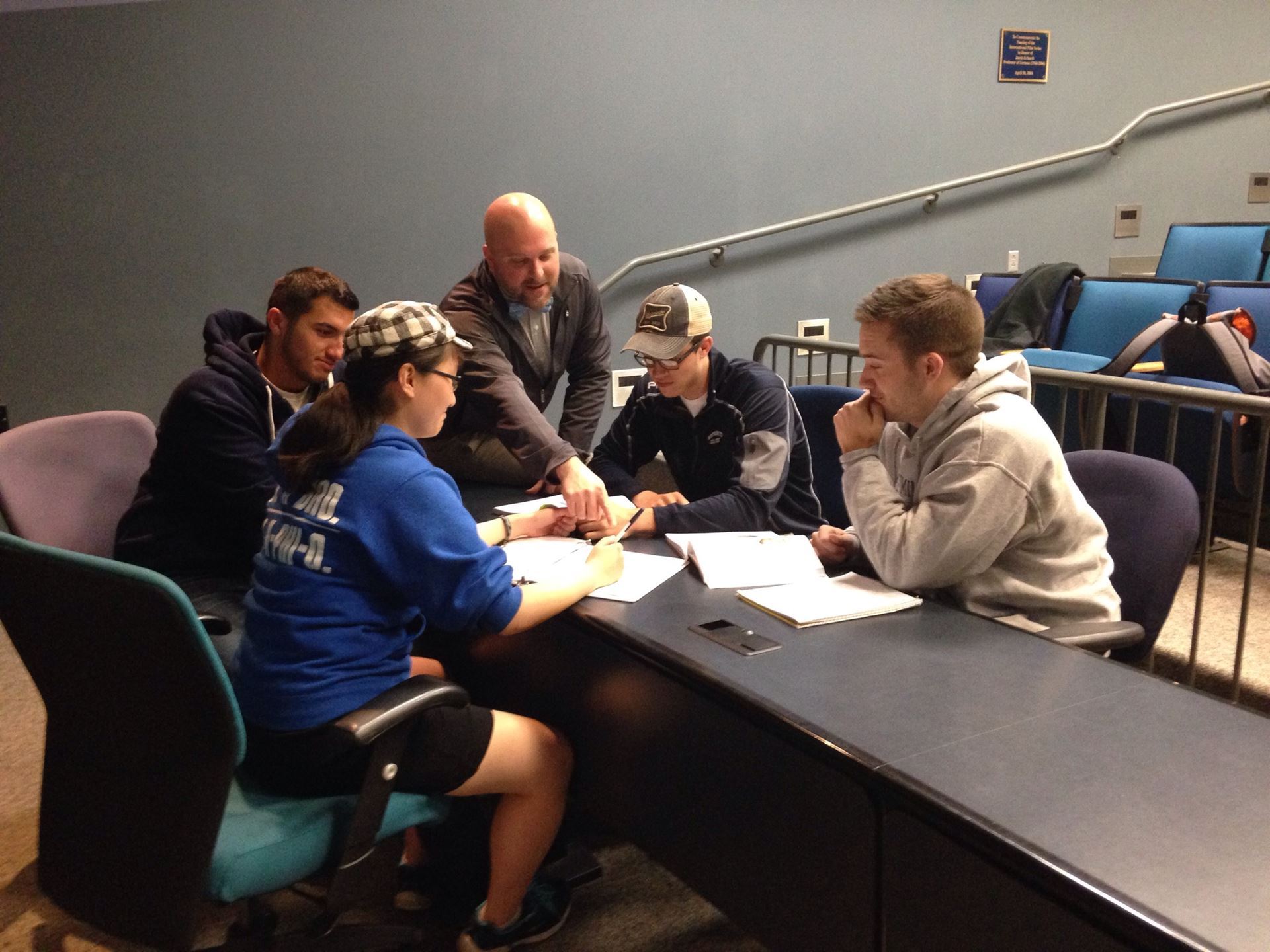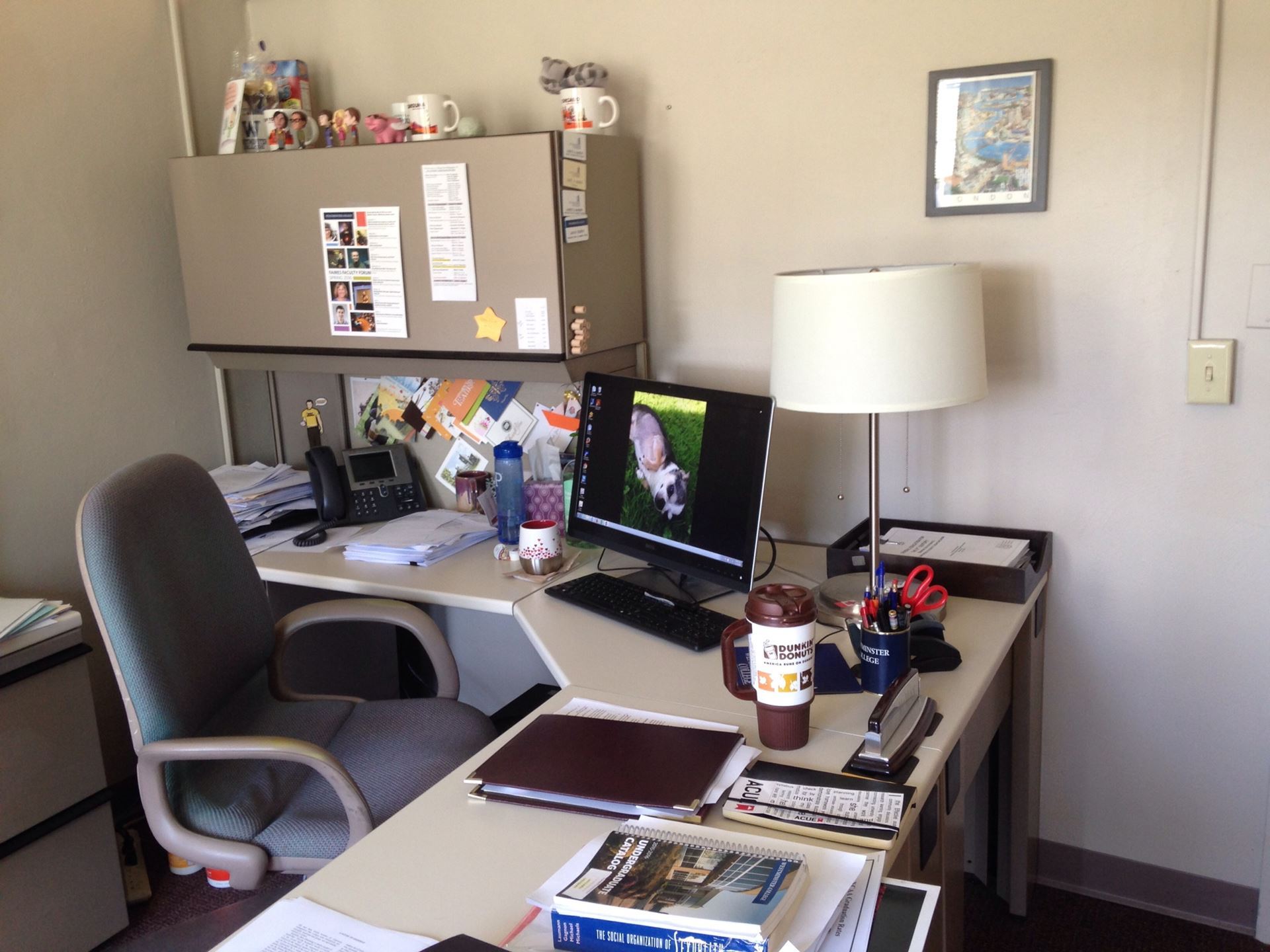 School name: Westminster College (PA)
School name: Westminster College (PA)
Type of school: small liberal arts school
School locale: rural area
Classes you teach: I have taught introductory, social, organizational, personality, human sexuality, psychology of the internet, research methods, and senior research/capstone
Average class size: 17
What’s the best advice about teaching you’ve ever received?
I have to select only one? The great thing about an organization like the Society for the Teaching of Psychology is that you are able to network with some of the most successful teachers of psychology, and they are always eager to share their knowledge with you. Teaching me to be better in my field and profession is how they advise me best. Every conversation with a Dana Dunn, Ken Keith, or Janie Wilson is a moment when I can learn something that will help my students to achieve learning outcomes. I guess the best advice about teaching (warning: shameless plug!) was to join STP!
What book or article has shaped your work as a psychology teacher?
One of the best illustrations of my teaching philosophy comes from Paulo Coelho’s The Alchemist. Early in the novel, Coelho’s old king tells the story of a young boy who is sent to meet the wisest man in the world, with the hopes of discovering the secret of happiness. After a 40-day journey to find the man in a castle atop a mountain, the boy is told that the man is too busy to meet with him and that he should wander about the castle until the man is available. The wise man first gives the boy a spoon filled with oil and tells him to carry the spoon with him as he wanders, being sure not so spill any oil. When the boy returns a few hours later, the man asks him to describe all the palace wonders that he saw. The boy, embarrassed, responds that he was so focused on the oil in the spoon, that he didn’t pay attention to the treasures in the palace. The man sends the boy to wander through the palace again. This time, he returns having viewed many of the palace’s treasures, only to realize that he has spilled all the oil from the spoon. The wise man counsels the boy: “The secret of happiness is to see all the marvels of the world, and never to forget the drops of oil on the spoon.”
A good teacher knows that the academy is filled with treasures that have been collected across millennia, and we believe that those treasures bring happiness (and also tremendous responsibility). But a great teacher recognizes that students come with a spoon that holds the drops of oil they have collected in their short lives. Those drops of oil are important—they are motives, dreams, abilities, traditions—and we will help students find happiness to the extent that we and they appreciate the spoon and what it holds.
Briefly tell us about your favorite lecture topic or course to teach.
Social psychology is my favorite course to teach because it is about the lives of my students. Everything students do has a self or social component, and so it is really easy to engage students with course material. Also, they can “see” social psychology all around them. For many of them, neurotransmitters are abstractions that are not visible to the naked eye, but they can more easily notice conformity, attraction, persuasion, groupthink, and so on. These are phenomena that matter to them on a daily basis as they negotiate with bosses; resolve conflicts with significant others; attempt to change other students’ opinions about campus issues.
Briefly describe a favorite assignment or in-class activity.
One of my favorite activities to conduct in the laboratory component of my social psychology course draws on an experiment conducted by Tim Wilson and Jonathan Schooler (Study 1, 1991). These researchers suggest that people do not have much insight into their own cognitive processes; that is, we often do not know why we have certain cognitions, like attitudes that can be vague and unspecified. Moreover, Wilson and Schooler believe that reflecting on our attitudes and decisions can actually be unhelpful. They suggest that when we think about why we hold certain attitudes, we attend to explanations that easily come to mind. But those accessible explanations may not be accurate or complete, thus having little effect on their attitude. Ultimately, thinking about reasons can lead people to make choices that are not ideal. To help students understand this, I bring in their favorite condiment—different varieties of salsa that have been rated by Consumer Reports. I ask students to taste each salsa on a chip and to evaluate it, with half being prompted to think about reasons for their evaluation. After we analyze patterns in the data, we talk about the original research and ways that we would have improved on my taste-test methodology were we to implement it in a well-controlled study. (I intentionally create a weakly controlled taste-test “experiment” so that students have plenty to critique—and they do!) So in the context of doing something they enjoy (eating salsa), we can talk about research and good experimental design. It’s like when Mom got us to eat our vegetables by covering them with cheese.
What teaching and learning techniques work best for you?
 Students’ learning is vital to what I do. I do not believe that learning frequently occurs by happenstance. It is my responsibility as a faculty member to think about what students need to learn and then to shape a course curriculum that helps them to achieve that learning. It is also my responsibility to monitor progress so that I can provide assistance when students are not learning what they need to know or do. This has led to more careful planning when writing assignments and student learning outcomes, creating assessment strategies, and providing feedback on student performance. Learning that informs assessment that informs teaching is critically important to me.
Students’ learning is vital to what I do. I do not believe that learning frequently occurs by happenstance. It is my responsibility as a faculty member to think about what students need to learn and then to shape a course curriculum that helps them to achieve that learning. It is also my responsibility to monitor progress so that I can provide assistance when students are not learning what they need to know or do. This has led to more careful planning when writing assignments and student learning outcomes, creating assessment strategies, and providing feedback on student performance. Learning that informs assessment that informs teaching is critically important to me.
We know that students learn best when material is connected to them and their interests. Students also learn best from High-Impact Practices that engage them with material, versus being passive recipients of information passed through lecture. My class sections certainly have the lecture component so that students have the knowledge they need, but more than likely students will be found doing. They will be engaged in critical analysis of video clips (Big Bang Theory offers many examples that are helpful in psychology courses); discussions with their peers; Plicker-based activities (thanks to Sue Frantz for turning me onto Plicker!); experiential learning in the laboratory or field. Involving students in and making them responsible for their own learning is vital to my teaching.
What’s your workspace like?
Unfortunately, my work space is not as tidy as I would hope. I live my life in neat piles that do not necessarily have an organizational scheme. Fewer piles are a bucket-list item, but I won’t be disappointed if it is never crossed off my list.
 Other than that, my workspace is comfortable because I spend a lot of time in my office. I use lamps instead of horribly institutional halogen lights, and my teapot is always ready with jasmine or English Breakfast tea. I have a collection of Dunkin Donuts mugs from different cities I have visited, and those line my shelf with a collection of Big Bang Theory bobble-head figures. Near my desk, I keep a string of thank-you cards from students who have written me over the years. These cards remind me of my passion: students and their learning.
Other than that, my workspace is comfortable because I spend a lot of time in my office. I use lamps instead of horribly institutional halogen lights, and my teapot is always ready with jasmine or English Breakfast tea. I have a collection of Dunkin Donuts mugs from different cities I have visited, and those line my shelf with a collection of Big Bang Theory bobble-head figures. Near my desk, I keep a string of thank-you cards from students who have written me over the years. These cards remind me of my passion: students and their learning.
Three words that best describe your teaching style.
Example-rich, student-orientated, accessible
What is your teaching philosophy in 8 words or fewer?
Every day, increase your excellence.
Tell us about a teaching disaster (or embarrassment) you’ve had and how you dealt with the situation.
The disasters I have faced usually result from a demonstration or activity that did not work as I had planned. Perhaps the data from an in-class experiment did not replicate patterns found in the literature. Or perhaps I just didn’t communicate my passion to students in a way that contributed to their own excitement for a topic. I have learned to have a Plan A and a Plan B. I also have learned that students benefit from watching us fail and later succeed by trying something different. That is, they are struggling to learn concepts and skills. When they see we can struggle, too, as we develop mastery, it actually enhances their own efficacy. By failing or coming upon an embarrassing situation, we can move into a space where learning from failure is okay. Quite honestly, I am no longer embarrassed by teaching mistakes or mishaps: A moment is a moment for learning.
What is something your students would be surprised to learn about you?
My students often are surprised to learn that I am southern. I lost my accent when I went to college, and it usually returns only when I am really tired or when I am talking to a family member in North Carolina. They also are surprised that I have a life outside of the college that includes a wonderful spouse, a regular lifting routine, a love for good food, and a fondness for international travel. They would not be surprised that I have an unhealthy obsession with Dunkin Donuts coffee (with unsweetened hazelnut and cream), any movie with Jennifer Lopez (she’s good for in-class examples on Sternberg’s different types of love), and a bizarre attachment to the APA Manual (6th edition, 2nd printing, please).
What are you currently reading for pleasure?
The Atlantis Gene…unfortunately, my pace is very slow because of work.
What tech tool could you not live without?
Right now, Plicker is my new teaching technology must-have. It is an online classroom response system that requires minimal setup and resources. I can create questions that allow me to assess my students’ learning in real-time, which then allows me to know where I need to begin, how quickly I can set the pace, and where problem areas may be. Students think it is cool…at least for the moment.
What is your hallway chatter like? What do you talk to colleagues about most (whether or not it is related to teaching/school)?
Now that I am serving in an administrator role, my hallway chatter is much different from what it was when I was strictly teaching. The administrator lens is 50,000-feet across the institution, and you realize there are many issues and events that you cannot talk about with colleagues. That is a big change from the old hallway chatter where we talked about everything. More likely than not, however, my colleagues and I talk about the latest best restaurant, a great bottle of wine, a must-visit vacation destination, or something that is not tied to the college.
